Africa/ December 05, 2017/By: Mustapha Hameed/Source: http://citifmonline.com
On Tuesday 12th September, 2017 at the West Africa Senior High School, the President, H.E. Nana Addo Dankwa Akufo-Addo launched the free senior high school education policy ushering the nation into an era where the age old creed of “education as a right not a privilege” assumes its true meaning.
Indeed, this has been the dream of the forebears of our republic; a Ghana where our children will not be denied the opportunity of senior high school education because of the inability of their parents to support them financially.
It is indeed a fact, that many young people since independence have been denied the opportunity of secondary education mainly due to financial constraints; hence it came as no surprise when Ghanaians all over the country received the news of the launch of this flagship policy with excitement. It was a dawn of a new era, an era that is not only bringing to our young people hope of a brighter future, a future with limitless and greater opportunities, but it also brings enormous financial relief to the overwhelming majority of parents who find it extremely hard to finance the education of their children.
If free education means one thing, then it is the fact that the era where pupils dropped out from school for financial reasons, or had their education cut short has become a thing of the past. It therefore came as no surprise that across the length and breadth of the country, the news of the launch was received in most instances amidst the display of joy and celebrations in our streets.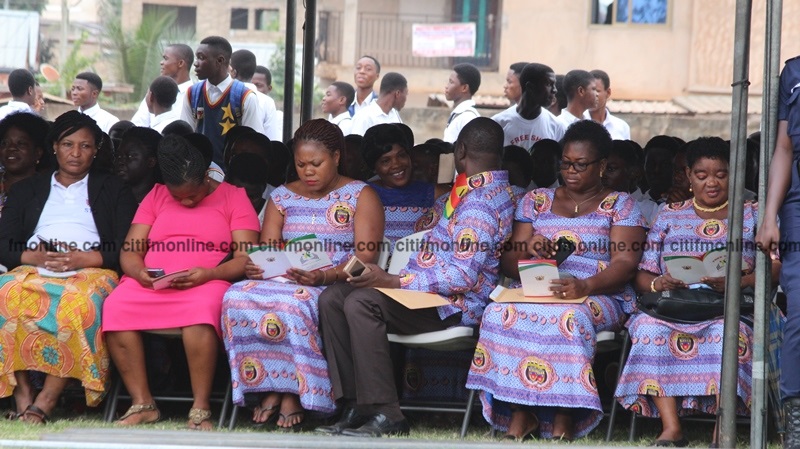
Free SHS like any pro-poor policy or any policy intervention for that matter has its own challenges. It is however unfortunate that today even problems with SHS three students, their classrooms and any other problems in our high schools are attributed to the Free SHS and pupils benefiting from the intervention.
So I want to ask, until the start of the Free SHS, were there no challenges in our schools already? Was it all rosy and glossy? Why is the NDC victimising students? Students whose only crime is that, they have chosen to go to school and their country has chosen to pay for it fully.
It is worth noting, that even before the implementation of the policy, the propaganda then, was that, government intended fidgeting and interfering with WAEC marking schemes so as many students would be affected and failed. This they claimed would affect enrolment causing a sharp reduction in enrolment figures so that government could fund the scheme for the few brilliant ones. It turned out cut-off points were lowered so every child could start SHS education. The effect – enrolment figures have been astounding, unlike anything we’ve ever seen before.

Minister of Education, Dr. Matthew Opoku Prempeh
This deliberate propaganda still do exist, but they now appear in different forms and seem to be aided for whatever reason by some media houses. For whatever its worth, the forces against this policy seem unrelenting and even more belligerent in their endeavours. How has it become a crime to dedicate part of our resources towards ensuring every child receives free secondary education? Do we bastardise a policy because of some few problems. In lecture halls and auditoria in some of our universities, students stand to listen to lectures because of inadequate seats, others go to lab and only observe because of inadequate equipment and other essentials, you attend lectures and you don’t hear anything because the PA System is faulty. In our halls of residence, we have people we refer to as ‘perchers’, a room for 4 people end up accommodating 10. In my room back in Katanga at KNUST, there were about 12 of us, in a cubicle meant for 4 people originally designed for one or two persons. Back then, one would hear stories about rooms that have never been locked, obviously because of the enormously high number of occupants. Did we condemn our universities over this? Were these problems also because of Free SHS?
You remember what they call ‘the shit on shit’ phenomenon? We went through these conditions and today our lives have seen tremendous improvements. Some of us have risen to greater heights, achieved greater feats and doing greater things. One man here who used to be my ‘percher’ rose through the ranks of one of the biggest banks in the world headquartered in New York, managing assets of multinational oil companies worth several billions of dollars.
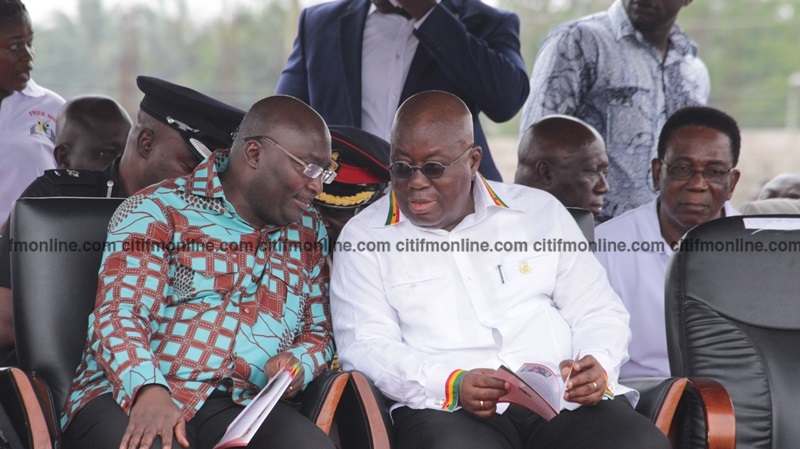
I remember back then at Anglican secondary school in Kumasi several years ago, students from other schools used to come in to use our labs and other facilities, this was years before the idea of Free SHS was conceived. I remember a senior high school that had a spill over of SSSCE candidates to other schools because they did not have enough facilities, some SHSs could not be approved WAEC centers because of inadequate infrastructure and facilities, this was aeons before Mr. President became a candidate for the first time.
Clearly, these were no challenges arising as a result of Free SHS; they are challenges that come with our educational system as a developing country which governments over time have tried to address. Should we have condemned high school education then because of these challenges? Where would we be today?
Today, our lecture halls, auditoria and theatres have received tremendous boosts, fully furnished, some with functioning central air conditioning systems. The conditions under which we study have improved. Most schools have moved beyond the blackboard-white chalk system to a healthier whiteboard-marker system. More dormitories have been built over time, more halls of residence and many other facilities to give our campuses a facelift and make them modern centres of learning. I remember the NPP’s model school system and the infrastructure it came with.
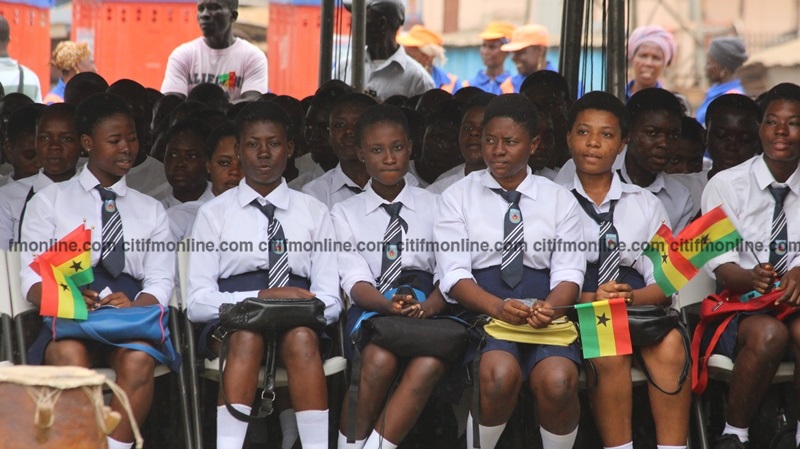
Why do I even have a feeling that hypocrisy is ingrained in our body-polity and there is a deliberate attempt by some people to destroy the opportunities created by the Free SHS? Even as I write this, pupils in basic schools still study under trees and other dilapidated structures. Did these start today? Were these the doing of the Free SHS policy? Must we deny those pupils the ability to read and write because they have no classrooms?
The problems of our education system did not start with the opportunity created for every child to receive free secondary education and it certainly won’t end here. And head teachers crying about problems in their schools as though those challenges haven’t persisted for years. Must we have shut down schools and stopped educating our children entirely because of challenges in our educational institutions?
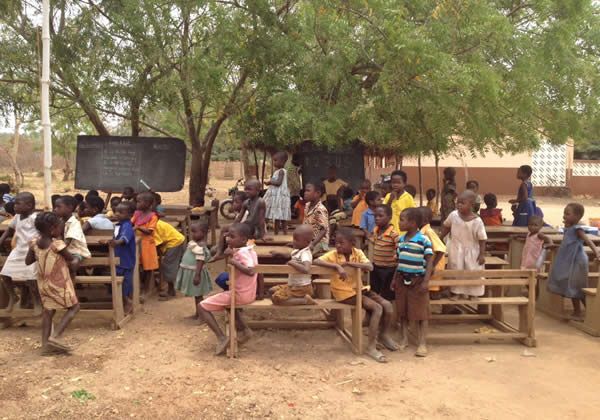
Pupils studying under a tree, an existing problem before Free SHS.
Must we have denied our children university education because of the challenges with facilities and infrastructure? Where would we be today? Ask yourself, those days you used to stand in the lecture hall, should government have revoked your admission or denied you admission on the basis of that alone, where would you be today? Or are the problems and challenges with infrastructure and facilities at our universities and basic schools also as a result of Free SHS?
With all the conditions and challenges that confronted us on all fronts in the education sector then, on no occasion did we see this level of bastardization and antagonism against university education or SHS. Because? It makes no sense, and we couldn’t refuse to educate ourselves on the basis of infrastructure and some challenges alone. These problems are solved over time and no country can claim anywhere that its education sector has no challenges. Today, democrats and republicans in congress are fighting each other because of budget cuts. Betsy Devos is always hot because these cuts are going to affect less endowed schools in deprived communities. But, education doesn’t stop because of challenges. Because things get better over time.
Today, even problems with the grass on the pitch of a high school are attributed to Free SHS. Yes, government including all of us do admit that, Free SHS, just as any other policy intervention has challenges, but these policies also have their success stories. We have heard about those challenges and we are doing everything possible to address them.
I want to ask those media houses that constantly feel the need to highlight on the infrastructural challenges of our high school system ever since this novel policy was rolled out, who seem to have a strong penchant for reporting only on the negatives of the policy, and who have carved an unpopular enviable niche for themselves in this business, that, did all challenges with high school education start with Free SHS? In their daily rounds, do they not see any positives of the Free SHS policy? Can they not see that, it has given opportunities to several thousands of young people who hitherto would be loitering our streets?

Have they not met people whose lives have been changed by the policy? Why do they find it extremely difficult to report on the glaring life changing testimonies of those affected by the policy? Must we destroy the policy because of some challenges in its first year of implementation? Even in their media houses, do they not have challenges? Do they detonate bombs to destroy their stations because of some challenges? Why do I sense that feeling that they have connived with the NDC and some misguided school heads, using propaganda, subterfuge, sabotage to paint a rather dark picture of an unprecedented policy initiative?
I have earlier on highlighted the challenges and circumstances under which most of us received our education, yet here we are today. We stand here today as doctors, as lawyers, as engineers, as economists, as policy makers as nurses, as teachers all products of a not-so-rosy education system. All products of an education system fraught from its basic level to its highest with deeper problems.
At some point under Prof. Mills, lecturers went on strike for seven weeks, disrupting the semester and throwing the academic calendar off balance, yet here we stand today. Here we stand today as professionals beaming with pride and doing what we can to contribute to the socio-economic development of this dear country. We sat through those challenges yet, we are able to compete with our colleagues anywhere on earth in fields of study or profession. What if we had been condemned because we sat under trees to study in primary school? What if we had been refused admission or our schools demonized because of inadequate facilities? What if someone had denied us university education citing inadequate facilities?
But today here we stand. As headmasters, yes, the policy certainly severs an illegitimate source of income for us. So what? When the university placed a ban on the sale of handouts, yes I was affected, but it was the larger picture that mattered. Today I buy PDFs and I gladly share with my students on WhatsApp to support their research. Many of whom have gone to work with big oil companies contributing their quota to developing this country. What if I had decided to sabotage my own school and students? Then running around to the media to bemoan the falling standards in our education. Who’d be the beneficiary? To what end?
The Free SHS has challenges, but if we had set our priorities right from the onset, these problems would probably not be this common as we make it seem or be here with us in the first place. Free SHS has challenges but most of these challenges existed before the policy, and it stopped no one from receiving education. Our senior high schools have problems and most have existed with us before the implementation of this policy. Free SHS came with its own challenges but it doesn’t in any way warrant the campaign of negativity and bad publicity as championed by some media houses. Free SHS has its own challenges and these are problems government is working assiduously to ameliorate. If we can speak of the challenges of these few schools, creating the unfortunate impression as though those challenges only arose from the implementation of the policy and they are so rampant when they’re but just some isolated cases, why can’t we also write about those overwhelming majority of schools where the policy is running without a scintilla of challenges?
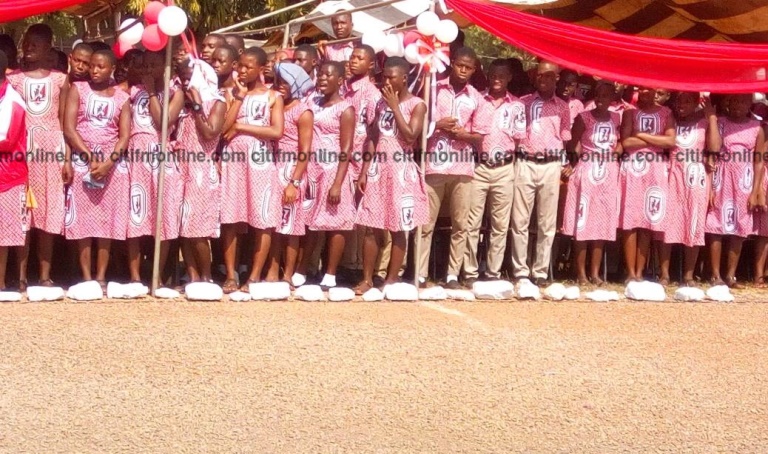
Free SHS may have its challenges but it is better it stays. If we cannot write a line to thank the president for this enormous intervention that will go down in history as the greatest thing we have gifted to ourselves by ourselves, then we have no business joining the bandwagon of doom mongers, purveyors of shenanigans, despicable chicanes and ill-wishers of the republic. If someone would even condemn this policy, must it even be the NDC? Those who have presided over us for half the period since independence yet cannot boast of a single policy beyond the stealing, naked thievery, CLS, and rape of our republic from all sides.
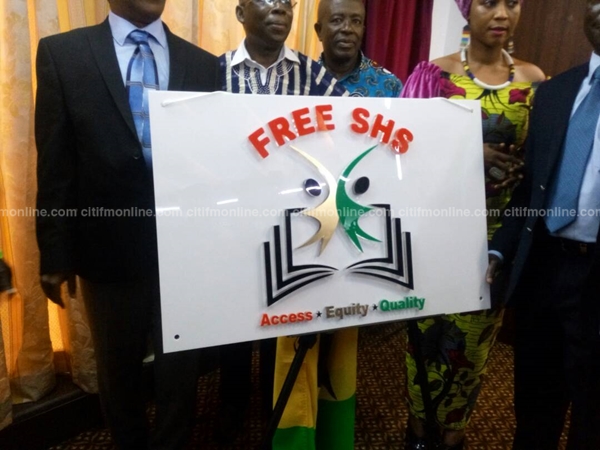
Today, the NDC is talking about policy document? What policy document did they need to pay Woyome and all the fraudulent judgement debts? What policy document did they use to implement the bus branding and the fraudulent schemes?
Thank you Mr. President, posterity never forgets and it certainly won’t forget this honourable gesture. Thank you Mr. Vice President, the education minister and everyone supporting to make this policy a success. Ghana is grateful, her future is even more grateful. And if there is anything that threatens the success of the Free SHS, then it is the NDC and its continuous existence.
–
By: Mustapha Hameed
The author is a Lecturer in Petroleum Engineering (KNUST) and a 2016 Mandela Washington Fellow.
Goldman School of Public Policy – University of California, Berkeley
Source:
http://citifmonline.com/2017/12/02/moral-case-free-senior-high-school-education-article/
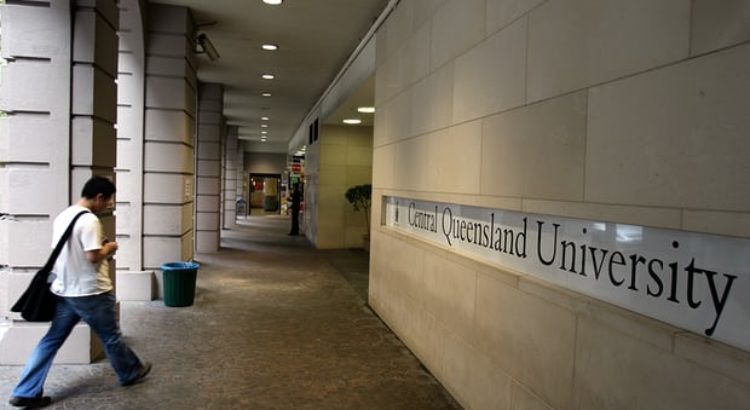
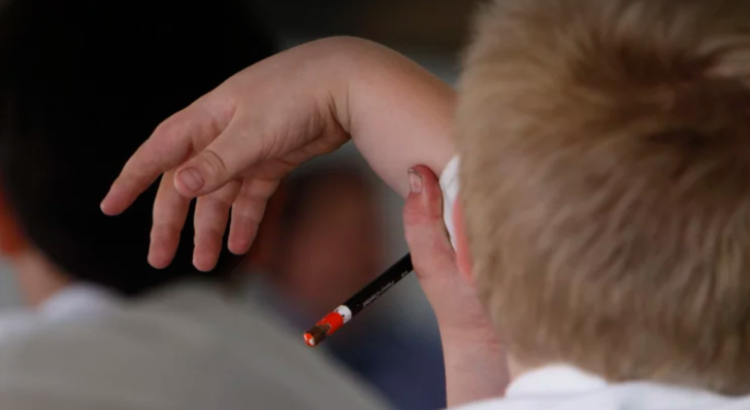
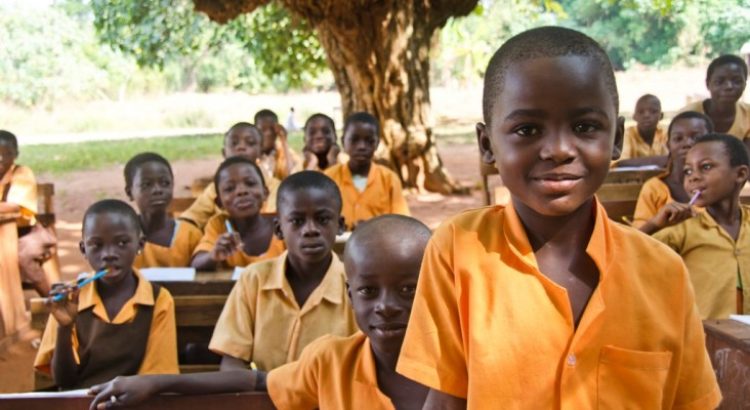
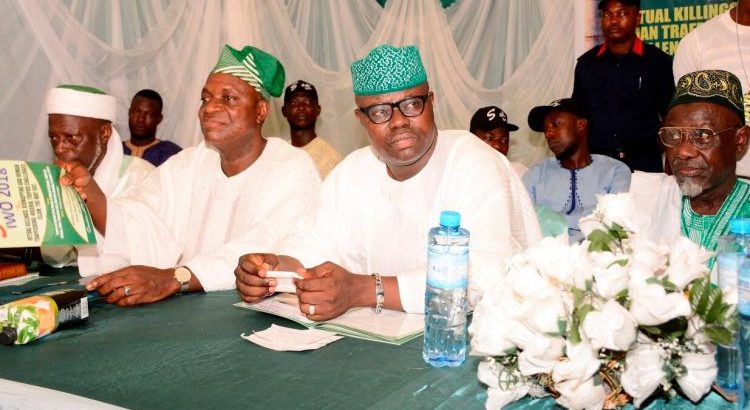

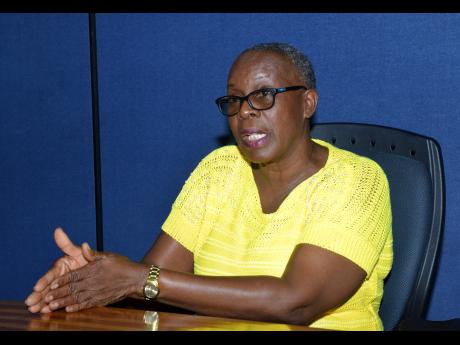
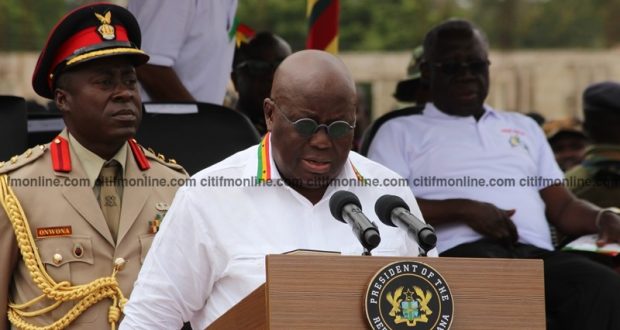















 Users Today : 191
Users Today : 191 Total Users : 35459786
Total Users : 35459786 Views Today : 351
Views Today : 351 Total views : 3418323
Total views : 3418323